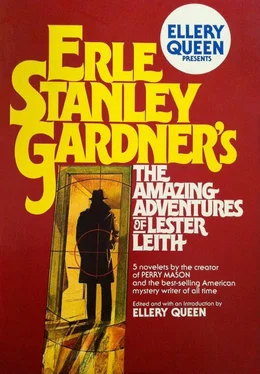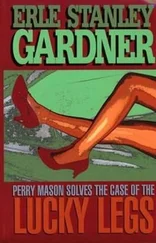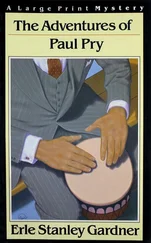Lester Leith whipped a tinted oblong of paper from his pocket and tore it into fragments. “Bosh,” he said, “I wouldn’t give you a thousand cents let alone a thousand dollars. You’re fired!”
Betcher drew himself up with dignity. “Permit me to observe,” he said, “that I wouldn’t work for clients whose mentality seems to be so eccentric, whose chiseling tactics are worse than those of the cheapest crook, and whose personality is distasteful to me. In short, Mr. Randerman, I have the honor to wish you a very good afternoon, and to congratulate myself upon having escaped the burden of having you as a client.”
Mrs. Randerman said, “Dear, you’ve hurt his feelings.”
“Hurt his feelings!” Lester Leith cackled. “I suppose now I’ll have to give fifty dollars apiece to the maid and housekeeper to square the beef with them. No wonder he cost the Click-Fast Shutter Company twenty-five thousand bucks! Greatest detective since Sherlock Holmes — Bah!”
The doorman at Lester Leith’s apartment house stared as Mrs. Randerman, alighting from a taxicab, turned to assist a bent figure attired in a white wig, a drooping walrus mustache and a bulging suit of ready-made clothes. The old man’s eyes were shielded from the light by very big dark glasses, the lenses larger than silver dollars, bordered with thick rims of white celluloid.
The two police detectives who had been shadowing the taxicab parked their car some twenty feet behind, and one of them, moving with crisp, businesslike efficiency, jumped to the curb and so timed his movements that he rode up in the same elevator which whisked Lester Leith to the floor of his penthouse apartment.
Mrs. Randerman fitted the latchkey which Leith handed her and then turned to confront the detective standing behind her. “What do you want?” she asked, her voice sharp with suspicion.
The detective said sharply, “Building inspector. A couple of fuses have blown in this apartment, and I think the wiring’s defective.”
“Well, I don’t,” Mrs. Randerman said. “I don’t think the owner of the apartment would care to be disturbed at this time.”
“I’m coming in anyway,” the detective said, pushing forward past Mrs. Randerman as the bent, white-haired figure opened the door.
Beaver, the undercover man, was waiting in the reception hallway. He flashed a quick warning wink to the detective who was posing as a building inspector.
Mrs. Randerman said to Leith, “This man insists on inspecting the wiring, Mr. Leith. I told him I didn’t think—”
“It’s all right,” Leith said dejectedly. He straightened his bent figure, dropped the crutch, threw the cane from him petulantly, ripped off the wig, dropped it to the floor, jerked off the smoked glasses and the walrus mustache. “Well, Scuttle,” he said, “I was wrong.”
“Wrong, sir?”
“Yes. It’s once I made a mistake. The man’s honest — hopelessly, stupidly honest.”
Leith raised his vest, loosened his belt, pulled out a pillow, and tossed it to the spy. “Put this back in my bedroom,” he said. “Lay out a gray suit, give these clothes to the Salvation Army. You may as well keep the imitation jewels, Mrs. Randerman. They might come in handy.”
The spy said, “Yes, sir.” He stooped to pick up the wig and the dark glasses, and said to the police detective, pointedly, “I think you’d better come back at another time, if you don’t mind. I can handle everything now — that is, if there’s anything wrong with the wiring.”
Lester Leith, the loose folds of the ready-made suit bagging about his well-knit figure, said, “Oh, let him inspect, Scuttle. Mrs. Randerman and I want a Scotch and soda.”
Leith walked into the living room, held a chair for Mrs. Randerman, then dropped dejectedly into his favorite reclining chair.
The police detective and the undercover man held a hurried, whispered conversation. Then the detective eased himself through the door, to report to Sergeant Ackley that Leith had been shadowed to the very door of his apartment.
Beaver took the pillow and articles of disguise into the bedroom, secured ice cubes from the refrigerator, wheeled the portable bar into the living room, and regarded Leith’s lugubrious countenance with shrewd, glittering eyes.
Leith said, “Use the tallest glasses you have, Scuttle.”
“Yes, sir. Your trip a failure, sir?”
Leith said, “Yes. My deductions were absolutely wrong, Scuttle. I felt certain that Betcher had switched the bills just as he handed them to Alcott.”
“Now you’ve changed your mind?” the spy asked.
“Definitely, Scuttle. I set a trap for Betcher. If he’d been inclined to chisel, he’d have given me a kickback on Mrs. Randerman’s check. He didn’t do it. The man’s honest, I tell you. Stupid, opinionated, conceited, overrated, egotistical — but honest, blast him!”
“Yes, sir,” the spy said. “Of course that’s only one possibility, sir.”
Leith said testily, “Well, we won’t discuss it now, Scuttle. Get those drinks ready.”
Leith opened his wallet and took out a sheaf of fifty-dollar bills. He passed them over to Mrs. Randerman. “Here you are,” he said, “one thousand dollars in fifties.”
She said, “Really, Mr. Leith, I feel guilty taking this money. It’s a gross overpayment, particularly since you—”
“That’s all right,” Leith said, leaning across to drop the money into her lap. “The money means very little to me. I’m chagrined to think that I was so wrong. Well, I’ll drink your health, Mrs. Randerman, and then you can be on your way, and Beaver will help me get rid of this abominable suit.”
Fifteen minutes later, when Mrs. Randerman had left, Leith again took his wallet from his pocket. “Well, Beaver,” he said, “I owe you fifty dollars.”
The spy said, virtuously, “Oh, now, sir, that bet was just for the purpose of trapping Sergeant Ackley. You can give me the twenty-five dollars which is his share of the bet and—”
“No, no, Scuttle. It was a bet, and when I lose a bet I pay off.”
He handed the spy fifty dollars, and as he took the fifty-dollar bill from his wallet, a limp, bedraggled white feather fell out into his hand.
Leith looked at it and laughed sardonically.
The spy said, “That feather doesn’t seem to have brought you any luck, sir.”
“It hasn’t,” Leith said.
“May I ask why you wanted it?” the spy inquired.
Leith said, dejectedly, “Oh, that was just a second string to my bow, Scuttle.”
“I’m afraid I don’t understand.”
Leith’s voice was flat with disinterest. “You see, Scuttle,” he explained patiently, “there were three possibilities. Either Betcher was crooked, Alcott was crooked, or Judge Mandeville actually took the bribe. Because of the crude manner in which the thing was handled, I was very much inclined to give Mandeville a clean bill of health. If he’d wanted a bribe, he’d have gone about it in a more skillful manner. After all, you know, he has a trained legal mind. I picked Betcher as being the more likely suspect. I was wrong. The feather proves it. If I’d only taken the trouble to look at this feather early this afternoon, I’d have saved myself a lot of work and a humiliating experience.”
The spy stared at the feather. “I don’t see how you reach that conclusion, sir.”
Leith said wearily, “It’s simple, Scuttle. The feather which Alcott was holding up in that newspaper photograph was nice and fluffy. This feather has been pressed together, is worn and bedraggled. Yet it’s been in my wallet less than twenty-four hours. Alcott claimed he’d been carrying that feather for more than a year. I carry my wallet in my hip pocket, but even if Alcott had his wallet in his breast pocket, within a week at the most that feather would have been pressed flat, the edges would have been worn, and it would have had this same bedraggled appearance.”
Читать дальше












